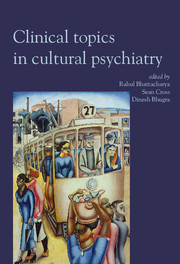Book contents
- Frontmatter
- Dedication
- Contents
- List of tables
- List of boxes
- List of figures
- List of contributors
- Preface
- Part 1 Theoretical and general issues
- 1 Globalisation, psychiatry and human rights: new challenges for the 21st century
- 2 Migration and mental illness
- 3 Mental health of refugees and asylum seekers
- 4 Racism, racial life events and mental ill health
- 5 Expressed emotion across cultures
- 6 Mental illness in Black and Asian ethnic minorities: care pathways and outcomes
- 7 Poverty, social inequality and mental health
- Part 2 Specific mental health conditions across cultures
- Part 3 Management issues in the cultural context
- Index
5 - Expressed emotion across cultures
from Part 1 - Theoretical and general issues
Published online by Cambridge University Press: 02 January 2018
- Frontmatter
- Dedication
- Contents
- List of tables
- List of boxes
- List of figures
- List of contributors
- Preface
- Part 1 Theoretical and general issues
- 1 Globalisation, psychiatry and human rights: new challenges for the 21st century
- 2 Migration and mental illness
- 3 Mental health of refugees and asylum seekers
- 4 Racism, racial life events and mental ill health
- 5 Expressed emotion across cultures
- 6 Mental illness in Black and Asian ethnic minorities: care pathways and outcomes
- 7 Poverty, social inequality and mental health
- Part 2 Specific mental health conditions across cultures
- Part 3 Management issues in the cultural context
- Index
Summary
Summary Expressed emotion (EE) has been used as a construct in understanding the interaction between patients and their carers and families. A considerable amount of data from Western cultures suggests that living in high-EE families can lead to relapse of schizophrenia in vulnerable individuals, even when they are on medication. However, the data from other cultures are less solid. This chapter reviews some of the existing findings and recommends that various components of EE must be seen in the cultural context and embedded in the normative data of the population before the concept can be considered in association with the pathogenesis of relapse.
Some 40 years ago, the hypothesis was put forward that ordinary aspects of family life are crucial to an understanding of how families interact with those among them who have mental illnesses (Brown, 1985). The concept and measurement of the ‘expressed emotion’ (EE) within families were developed in the 1960s, initially for use in schizophrenia. They were subsequently used for a number of physical and psychiatric conditions, ranging from dementia to diabetes and Parkinson's disease. They have been a major impetus for the development and evaluation of social treatments of schizophrenia (Kuipers & Bebbington, 1990). The family's EE has been shown to be predictive of outcome in mental and physical illnesses in a variety of cultural settings.
Family environment is crucial both in the development of the individual and in creating and sustaining psychopathology in vulnerable individuals. There are studies which look at a socialisation paradigm, explaining how parental negativity can undermine children's learning about emotions and their management (Hoffman, 1983). Thus, the child may grow up without really understanding the implicit and explicit messages carried in the way the emotions are expressed. Externalising behaviours may be strongly influenced by family interactions that reinforce escalating negative affect and aggression (Beauchaine et al, 2007). One example of this has been in the field of self-harm, where the quality of communication and social problem-solving in the families has been studied (Tulloch et al, 1997; Speckens & Hawton, 2005; Nock & Mendes, 2008).
- Type
- Chapter
- Information
- Clinical Topics in Cultural Psychiatry , pp. 52 - 67Publisher: Royal College of PsychiatristsPrint publication year: 2010



